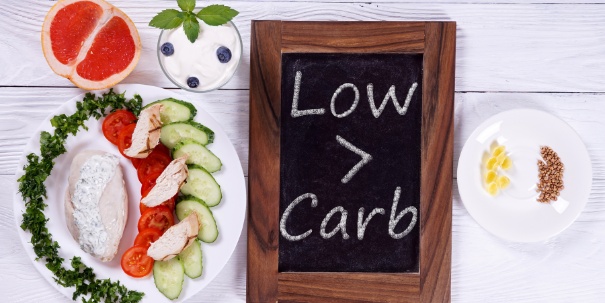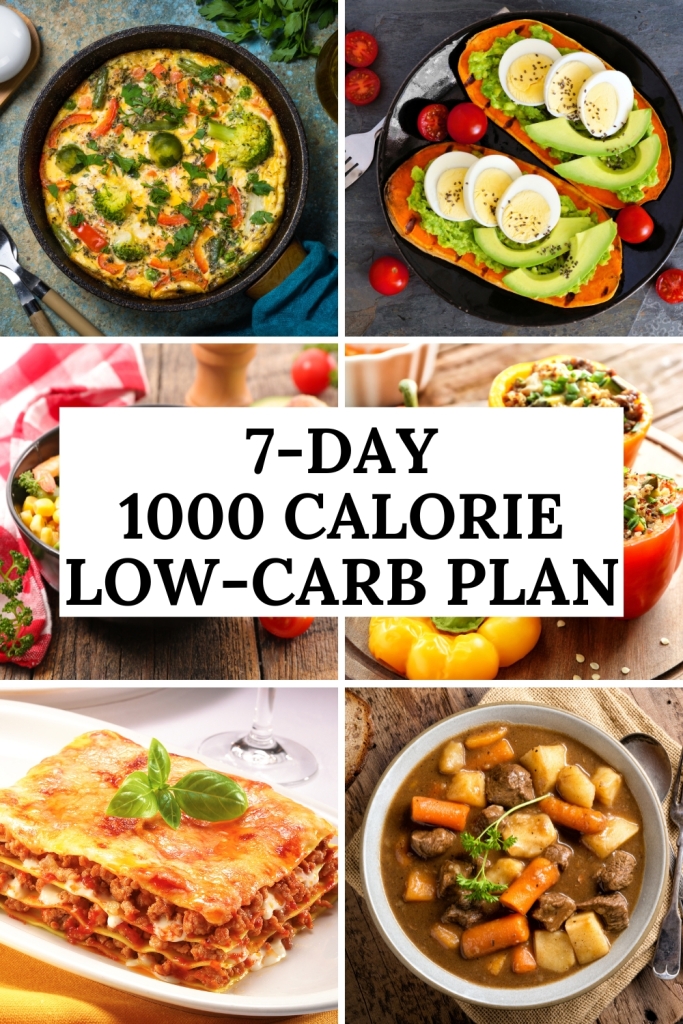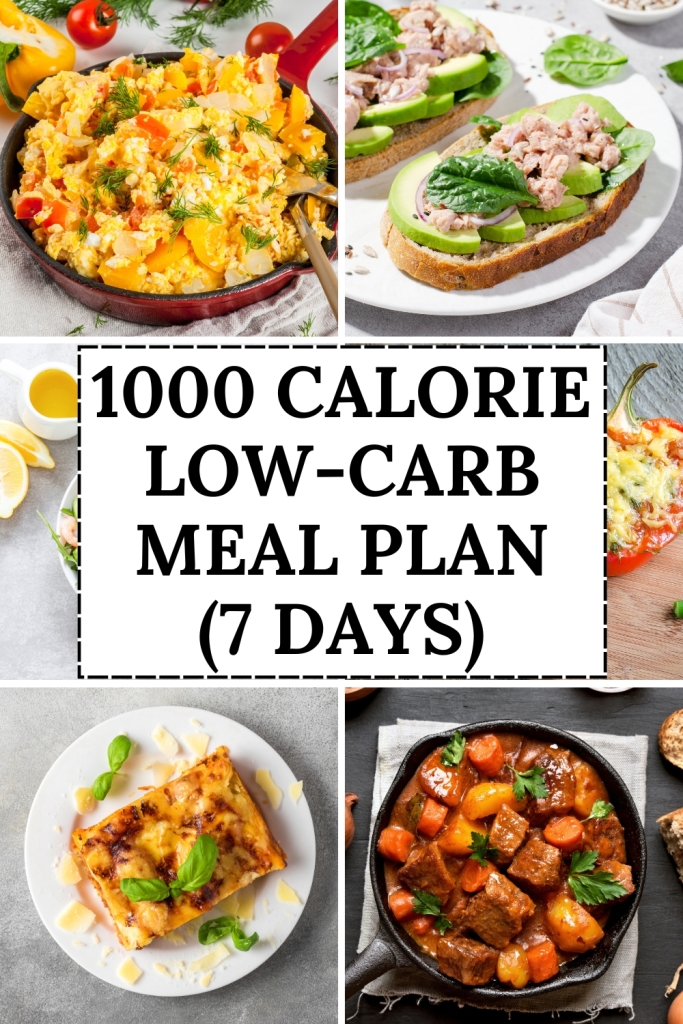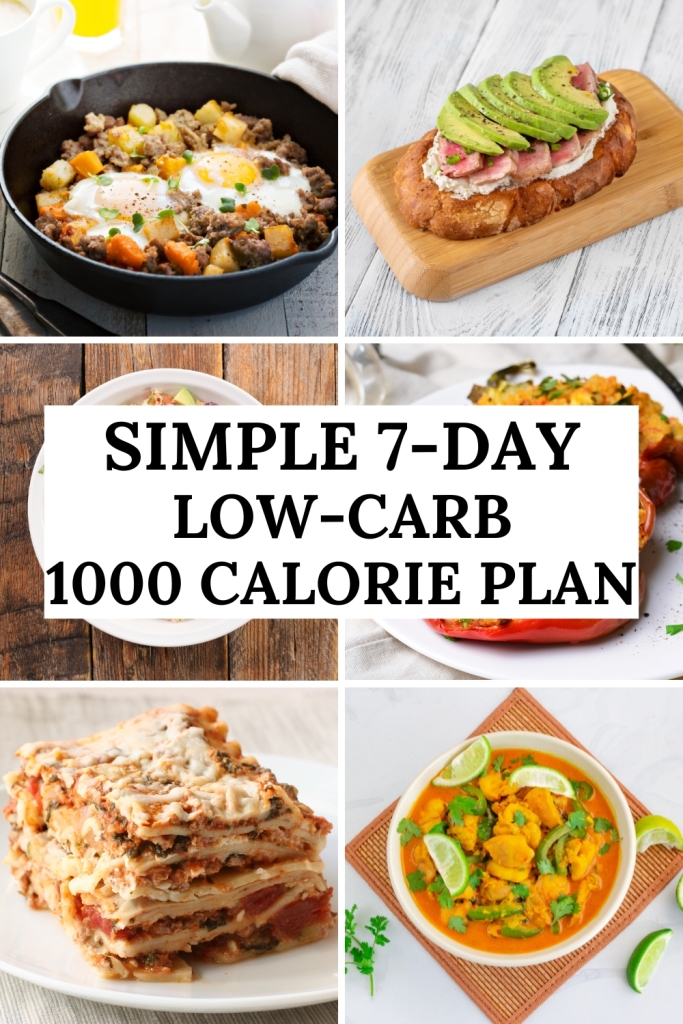Ever felt like you're stuck in a dietary maze, with endless paths leading to nowhere? You crave a way to shed those extra pounds without sacrificing flavor or feeling constantly hungry. The secret lies in understanding how to manipulate your body's fuel source. Imagine a world where you can enjoy delicious meals while effortlessly trimming your waistline. It may sound like a fantasy, but it's the reality of a low-carb lifestyle. This 7-day low-carb 1000-calorie meal plan is your guide to unlocking this reality.
Why Low-Carb? The Science of Slimming Down

Before we dive into the delectable details of this meal plan, let's understand the science behind it. Our bodies primarily use carbohydrates for energy. When we consume more carbs than our bodies need, they are stored as fat. By reducing carbohydrate intake, we force our bodies to tap into those fat reserves for fuel, leading to weight loss.
This meal plan, with its carefully calibrated macronutrient ratio of 10-20% carbs, 25-30% protein, and 40-60% fat, not only promotes weight loss but also provides sustained energy and keeps those hunger pangs at bay.
The Benefits Beyond Weight Loss
But the advantages of a low-carb diet extend beyond just shedding pounds. Studies have shown that it can also:
- Improve blood sugar control: By reducing blood sugar spikes, it can help manage or even prevent type 2 diabetes. (Source: Diabetes Care)
- Lower blood pressure: A low-carb diet can contribute to healthier blood pressure levels. (Source: Hypertension)
- Increase HDL (good) cholesterol: This helps improve heart health and reduce the risk of cardiovascular diseases. (Source: The American Journal of Clinical Nutrition)
- Reduce triglycerides: High levels of triglycerides are linked to heart disease, and a low-carb diet can help lower them. (Source: The Journal of the American Medical Association)
Your 7-Day Low-Carb 1000-Calorie Meal Plan

This meal plan offers a tantalizing array of low-carb dishes that are as satisfying as they are healthy. Each day features a breakfast, lunch, afternoon snack, and dinner, all meticulously planned to provide around 1000 calories while maintaining the optimal macronutrient balance.
Day 1
- Breakfast: Skillet Eggs with Tomatillos & Spinach (1 serving)
- Lunch: Avocado Shrimp Salad (1 serving)
- Afternoon Snack: Greek Yogurt with Almonds (¾ cup (170g) plain whole-milk Greek yogurt with 1 tbsp (14g) sliced almonds)
- Dinner: Lasagna with Zucchini Noodles (1 serving)
Daily Totals: Calories: 1108, Carbs: 38g, Protein: 91g, Fat: 75g
Day 2
- Breakfast: 10-Minute Spinach Omelet (1 serving)
- Lunch: Antipasto Salad (1 serving)
- Afternoon Snack: Hard-Boiled Eggs with Spinach (2 large hard-boiled eggs (100g) on a bed of 1 cup (30g) fresh spinach)
- Dinner: Chicken Pot Pie with Almond Flour Crust (1 serving)
Daily Totals: Calories: 988, Carbs: 39g, Protein: 65g, Fat: 64g
Day 3
- Breakfast: Muffin-Tin Spinach & Mushroom Mini Quiches (1 serving)
- Lunch: Tuna Salad with Avocado (1 serving)
- Afternoon Snack: Avocado on Low-Carb Toast (1 slice (28g) low-carb bread with ¼ medium avocado (50g))
- Dinner: Beef Stew (1 serving)
Daily Totals: Calories: 1030, Carbs: 45g, Protein: 70g, Fat: 63g
Day 4
- Breakfast: Avocado & Kale Omelet (1 serving)
- Lunch: Zucchini Noodles with Marinara Sauce and Meatballs (1 serving)
- Afternoon Snack: Cottage Cheese with Strawberries (½ cup (113g) full-fat cottage cheese with ¼ cup (37g) sliced strawberries)
- Dinner: Thai Coconut Curry with Chicken and Vegetables (1 serving)
Daily Totals: Calories: 1122, Carbs: 46g, Protein: 66g, Fat: 77g
Day 5
- Breakfast: Tuna & Avocado Sweet Potato Toast (1 serving)
- Lunch: Lettuce Wrap Burgers (1 serving)
- Afternoon Snack: Smoked Salmon and Cream Cheese Roll (2 oz (56g) smoked salmon spread with 1 tbsp (14g) cream cheese)
- Dinner: Shrimp Scampi with Zoodles (1 serving)
Daily Totals: Calories: 1044, Carbs: 34g, Protein: 84g, Fat: 76g
Day 6
- Breakfast: Smoked Salmon Scrambled Eggs (1 serving)
- Lunch: Stuffed Bell Peppers (1 serving)
- Afternoon Snack: Almond Butter on Celery Sticks (2 medium celery stalks (80g) with 1 tbsp (16g) almond butter)
- Dinner: Stuffed Peppers (1 serving)
Daily Totals: Calories: 1117, Carbs: 49g, Protein: 76.5g, Fat: 68.5g
Day 7
- Breakfast: Avocado & Smoked Salmon Omelet (1 serving)
- Lunch: Chicken Salad Lettuce Cups (1 serving)
- Afternoon Snack: Cheese and Turkey Roll-Ups (1 oz (28g) sliced turkey breast wrapped around 1 oz (28g) cheddar)
- Dinner: Spaghetti Squash with Meat Sauce (1 serving)
Daily Totals: Calories: 1111, Carbs: 49g, Protein: 93g, Fat: 54g
This meal plan is a template, and you can adjust it based on your preferences and dietary needs. Remember to consult with a healthcare professional or a registered dietitian before making significant dietary changes, especially if you have any underlying health conditions.
Tips for Low-Carb Success

Embarking on a low-carb journey can be exciting, but it's essential to be prepared. Here are some tips to help you stay on track and achieve your goals:
1. Stock Your Pantry
A well-stocked pantry is your arsenal in the battle against carb cravings. Fill it with low-carb staples like:
- Healthy Fats: Olive oil, avocado oil, coconut oil, nuts, seeds, avocados
- Protein Powerhouses: Eggs, meat, poultry, fish, seafood
- Low-Carb Veggies: Leafy greens, broccoli, cauliflower, zucchini, peppers
- Pantry Essentials: Almond flour, coconut flour, spices, herbs, unsweetened sauces
2. Meal Prep is Your Best Friend
Preparing your meals in advance can save you time and prevent impulsive unhealthy choices. Dedicate a few hours each week to prepping your meals and snacks.
3. Stay Hydrated
Water plays a crucial role in weight loss and overall health. Aim for at least 8 glasses of water per day.
4. Listen to Your Body
Pay attention to your body's hunger and fullness cues. Don't force yourself to eat if you're not hungry, and stop eating when you're satisfied, not stuffed.
5. Embrace the Journey
Remember that sustainable weight loss is a marathon, not a sprint. Focus on making gradual, long-term changes to your lifestyle rather than seeking quick fixes.
Navigating the Low-Carb Landscape: Challenges and Solutions

While a low-carb diet offers numerous benefits, it's not without its challenges. Here are some common hurdles you might encounter and how to overcome them:
1. Carb Cravings
Initially, you might experience intense cravings for carb-rich foods. This is normal as your body adjusts to its new fuel source. Here are some strategies to combat those cravings:
- Increase Healthy Fats: Ensure you're consuming enough healthy fats to keep you satiated and reduce cravings.
- Distract Yourself: Engage in activities you enjoy to take your mind off food.
- Find Low-Carb Alternatives: Explore low-carb substitutes for your favorite carb-heavy foods. For instance, cauliflower rice can replace traditional rice, and zucchini noodles can stand in for pasta.
2. Social Situations
Social gatherings often revolve around food, which can be challenging when you're on a low-carb diet. Here are some tips to navigate these situations:
- Plan Ahead: If you know you'll be eating out, research the restaurant menu beforehand and choose low-carb options.
- Bring a Dish: Offer to bring a low-carb dish to share so you have something you can enjoy.
- Focus on Socializing: Remember that the primary purpose of social gatherings is to connect with people, not just to eat.
3. “Keto Flu”
Some people experience flu-like symptoms, such as headache, fatigue, and nausea, during the initial stages of a low-carb diet. This is often referred to as the “keto flu” and is usually temporary. To alleviate these symptoms:
- Stay Hydrated: Drink plenty of water and electrolytes.
- Increase Salt Intake: Sodium levels can drop on a low-carb diet, so consider adding a pinch of salt to your food or drinking broth.
- Get Enough Rest: Ensure you're getting adequate sleep.
Beyond the 7 Days: Maintaining a Low-Carb Lifestyle

This 7-day meal plan is just the beginning of your low-carb journey. To reap the long-term benefits, it's crucial to adopt a sustainable low-carb lifestyle. Here are some key principles to keep in mind:
1. Focus on Whole Foods
Prioritize whole, unprocessed foods like vegetables, fruits, meat, poultry, fish, eggs, nuts, and seeds.
2. Limit Processed Foods
Minimize your intake of processed foods, sugary drinks, and refined grains.
3. Be Mindful of Portion Sizes
Even with healthy foods, portion control is essential to manage calorie intake.
4. Stay Active
Regular physical activity complements a low-carb diet and enhances its benefits.
5. Listen to Your Body
Pay attention to how your body responds to different foods and adjust your diet accordingly.
This low-carb journey is about more than just weight loss; it's about reclaiming your health and vitality. By embracing this lifestyle, you're not just choosing a diet; you're choosing a path towards a healthier, more vibrant you. Remember, every journey begins with a single step. Take that step today, and embark on your low-carb adventure!
This 7-day low-carb 1000-calorie meal plan is your roadmap to a healthier lifestyle. It's a journey of culinary exploration, self-discovery, and ultimately, transformation. Remember, consistency is key. Stick to the plan, embrace the challenges, and savor the rewards. You've got this!
References
- Effects of a low-carbohydrate diet on weight loss and cardiovascular risk factor in overweight adolescents.
- Long-term effects of a ketogenic diet in obese patients.
- Efficacy and safety of low-carbohydrate diets: a systematic review.
- A Low-Carbohydrate, Ketogenic Diet versus a Low-Fat Diet To Treat Obesity and Hyperlipidemia: A Randomized, Controlled Trial.
- The effect of a low-carbohydrate, ketogenic diet versus a low-glycemic index diet on glycemic control in type 2 diabetes mellitus.
- A randomized trial of a low-carbohydrate diet for obesity.
- Very-low-carbohydrate ketogenic diet v. low-fat diet for long-term weight loss: a meta-analysis of randomised controlled trials.
- Effects of Low-Carbohydrate Diets Versus Low-Fat Diets on Metabolic Risk Factors: A Meta-Analysis of Randomized Controlled Clinical Trials.
- Low-carbohydrate diets and all-cause and cause-specific mortality: two cohort studies.
- Dietary carbohydrate restriction as the first approach in diabetes management: Critical review and evidence base.



- Save for Later6.3K





8 Responses
This meal plan sounds interesting, but 1000 calories seems really low. I’m worried about feeling hungry and deprived all the time. Is this a safe calorie level for weight loss?
Hi Sarah, That’s a valid concern. 1000 calories is definitely on the lower end of the spectrum. It’s designed to be a short-term plan to kickstart weight loss. This plan may be suitable for some, but it’s essential to listen to your body. If you’re feeling excessively hungry, weak, or fatigued, you may need to increase your calorie intake slightly. It’s always recommended to consult with a doctor or registered dietitian before starting any low-calorie diet, especially to determine the appropriate calorie level for your individual needs and health status. They can also help ensure you are meeting all your nutritional requirements.
I’m a vegetarian, and I’m interested in trying a low-carb diet. Can this meal plan be adapted for vegetarians?
Hi Jessica, While this particular meal plan is heavy on animal protein, you can certainly adapt the principles of low-carb eating to a vegetarian diet. You’ll need to find alternative protein sources like eggs, tofu, tempeh, and certain cheeses, being mindful of their carb content. There are many low-carb vegetarian recipes available online. You can find vegetarian versions of lasagna, chili, and even burgers that use low-carb vegetables and plant-based protein instead of meat. It’s also a good idea to consult with a registered dietitian to ensure you’re meeting all your nutritional needs on a low-carb vegetarian diet, especially regarding iron, vitamin B12 and omega 3 fatty acids.
1000 calories? Is this a diet for ants?! I’m pretty active, and I feel like I’d be hangry all day long on this plan. Also, ‘muffin-tin spinach & mushroom mini quiches’ on day 3? Who has time to make mini quiches on a weekday? I need something I can grab and go. Is this realistic for someone with a busy life?
Savannah, I totally get it! 1000 calories can seem daunting, especially if you’re used to eating more. This plan is a starting point, and you can definitely adjust it based on your activity level and how you feel. Maybe add some extra healthy fats or protein to keep you fuller longer. As for the mini quiches, think of them as meal-prep heroes! You can make a batch on the weekend and have breakfast ready for a few days. But if you’re really in a rush, a couple of hard-boiled eggs or some Greek yogurt with berries will do the trick too. The key is to find low-carb options that fit your lifestyle. Don’t be afraid to swap things out!
Okay, I’m intrigued by the science, but ‘Avocado on Low-Carb Toast’ sounds a little…sad. Is low-carb bread even any good? And where’s the dessert? A girl needs a little something sweet, even on a diet! Also, is it just me or does this feel like a lot of cooking? Any tips for someone who’s not exactly a master chef?
Iris, I hear you on the dessert front! It’s tough to ditch the sweets, but there are definitely low-carb treats out there. Think dark chocolate (in moderation!) or berries with a dollop of whipped cream. As for the low-carb toast, it’s not as bad as you might think! Some brands are actually pretty tasty. You can also use lettuce wraps or portobello mushrooms as bread substitutes if you’re feeling adventurous. And you’re right, this plan does involve some cooking. But a lot of these recipes are actually quite simple. Plus, cooking at home gives you more control over your ingredients and portion sizes. If you’re really pressed for time, there are plenty of pre-made low-carb meal options available these days. The most important thing is to find a sustainable way of eating that works for you. Don’t be afraid to experiment and find what you enjoy!